The Life and Artistic Journey of Vincent van Gogh: Blending the Past with the Present
مقدمة
Vincent van Gogh is a name that resonates powerfully in the world of art. His journey, marked by passion, struggle, and profound creativity, has left an indelible mark on the canvas of history. As we delve into the intricate tapestry of his life, we will also weave in modern elements that connect his enduring legacy to the contemporary art market. This narrative will balance historical accuracy with modern relevance, providing readers with a rich, immersive experience.
The Early Life of Vincent van Gogh
Vincent van Gogh is a name that resonates powerfully in the world of art. His journey, marked by passion, struggle, and profound creativity, has left an indelible mark on the canvas of history. As we delve into the intricate tapestry of his life, we will also weave in modern elements that connect his enduring legacy to the contemporary art market. This narrative will balance historical accuracy with modern relevance, providing readers with a rich, immersive experience.
Birth and Childhood
Vincent van Gogh was born on March 30, 1853, in Groot-Zundert, a small village in the Netherlands. From an early age, Vincent exhibited a deep fascination with the world around him, often immersing himself in nature, which later became a prominent theme in his works.
Engaging Childhood
Stories from Vincent’s childhood paint a picture of a sensitive and introspective boy. He was particularly close to his brother, Theo, whose unwavering support would play a crucial role in his life. Anecdotes from this period highlight Vincent’s early attempts at drawing and his profound connection to the natural world.
Initial Debuts and Career Struggles
Vincent’s early ventures into the art world were met with little success. He worked as an art dealer, teacher, and missionary before committing to painting fully. These years were marked by financial hardship and a sense of directionless wandering, reflecting many artists’ struggles in their early careers.
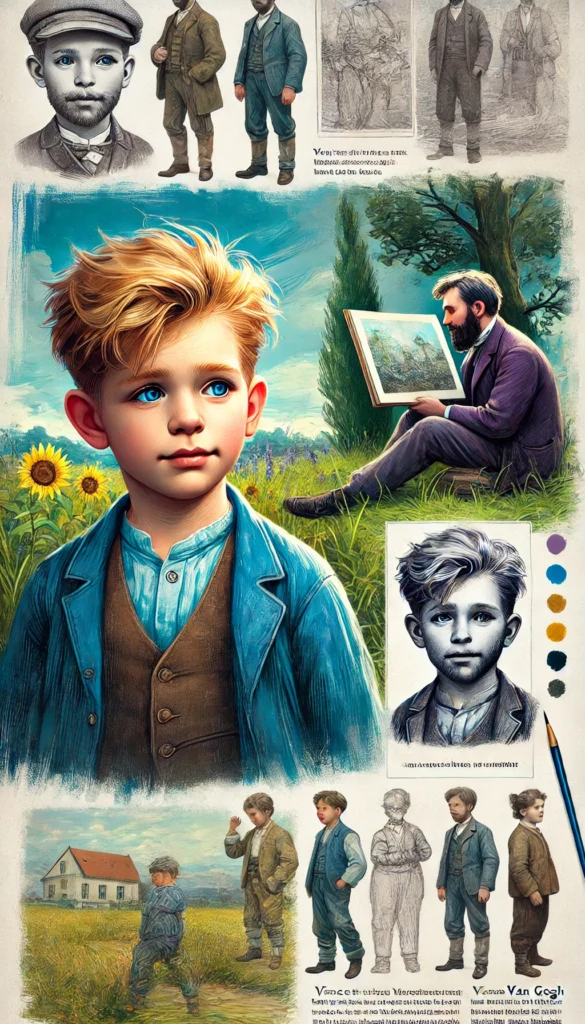
The Artistic Evolution of Vincent van Gogh
The Influence of Impressionism
In Paris, Vincent was introduced to the works of artists such as Claude Monet, Camille Pissarro, and Edgar Degas. The Impressionists’ vibrant colors and loose brushwork inspired Vincent to experiment with new techniques and a brighter palette. This period marked a significant turning point in his artistic development.
The Role of Theo van Gogh
Vincent’s younger brother, Theo van Gogh, was more than just a sibling; he was Vincent’s confidant, supporter, and financial lifeline. Theo’s belief in Vincent’s talent provided the emotional and financial support necessary for Vincent to pursue his art. Their correspondence offers invaluable insights into Vincent’s thoughts, struggles, and artistic philosophy.
Evolution of Style
Vincent’s style evolved from his early works’ dark, somber tones to the vibrant, expressive use of color that defines his later pieces. His bold, dynamic brushstrokes created a sense of movement and emotion, capturing the essence of his subjects in a revolutionary way for his time.
Vincent’s early works, such as “The Potato Eaters,” are characterized by their dark tones and depictions of peasant life. These paintings reflect his deep empathy for the working class and his desire to portray their struggles with authenticity and dignity.
Transition to Brighter Colors
After moving to Paris, Vincent’s palette lightened significantly. His works began to feature the vibrant colors and dynamic compositions he is best known for today. Paintings like “Sunflowers” and “Irises” exemplify this shift and showcase his innovative use of color.
Techniques and Methods
Vincent’s techniques were innovative and often unorthodox. He used color to convey emotion, layered paint thickly to add texture, and employed a swirling, rhythmic brushwork that became a hallmark of his style. His method was intuitive and deeply personal, reflecting his inner turmoil and passion.
Use of Color
Vincent’s use of color was both symbolic and expressive. He often used complementary colors to create vibrant contrasts and convey emotional intensity. His surroundings and his emotional state profoundly influenced his choice of colors.
Brushwork and Texture
Vincent’s brushwork was dynamic and varied, ranging from bold, sweeping strokes to delicate, intricate details. He frequently applied paint thickly, creating a rich texture that added depth and dimension to his works.
Development and Artistic Breakthroughs
Major Works and Themes
Some of Vincent’s most famous works include “Starry Night,” “Sunflowers,” and “The Bedroom.” Each piece reflects his intense emotional state and his ability to transform everyday scenes into profound, expressive art. His themes often revolved around nature, everyday life, and personal struggle.
Major Works and Themes
Starry Night
“Starry Night” is perhaps Vincent’s most iconic painting. Created during his stay at the Saint-Paul-de-Mausole asylum, the painting depicts a swirling night sky over a tranquil village. The intense movement of the sky contrasts with the stillness of the town, capturing the turbulent emotions Vincent experienced at the time.
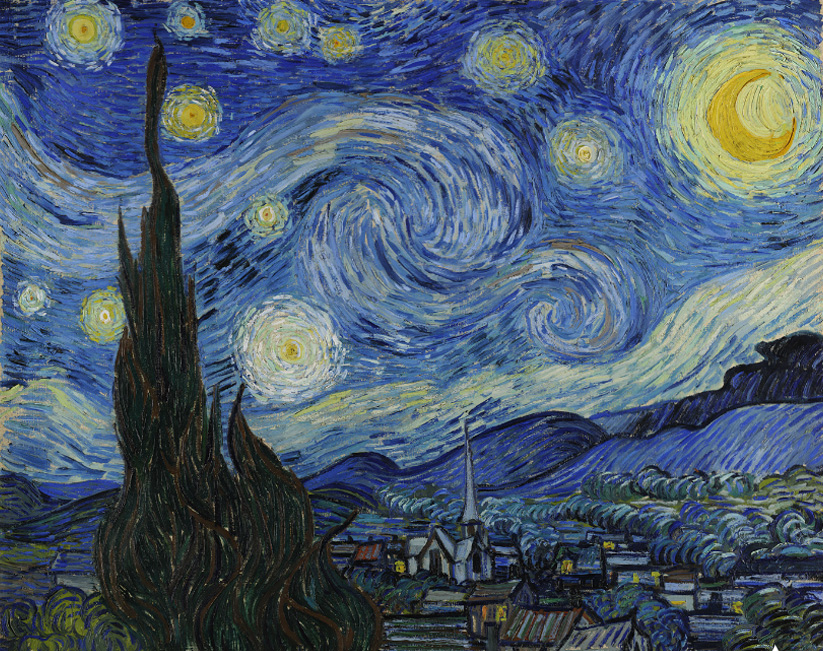
Major Works and Themes
Some of Vincent’s most famous works include “Starry Night,” “Sunflowers,” and “The Bedroom.” Each piece reflects his intense emotional state and his ability to transform everyday scenes into profound, expressive art. His themes often revolved around nature, everyday life, and personal struggle.
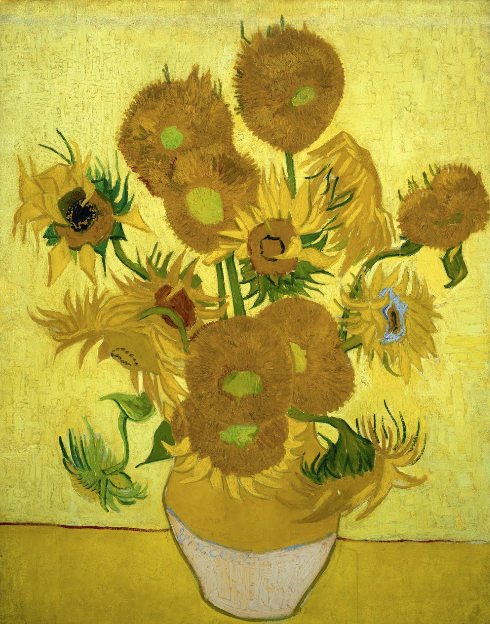
Sunflowers
The “Sunflowers” series celebrates life and color. Vincent painted these works as a symbol of gratitude and hope, intending them to decorate his friend Paul Gauguin’s room. The vibrant yellows and dynamic composition reflect Vincent’s admiration for nature’s beauty.
The Bedroom
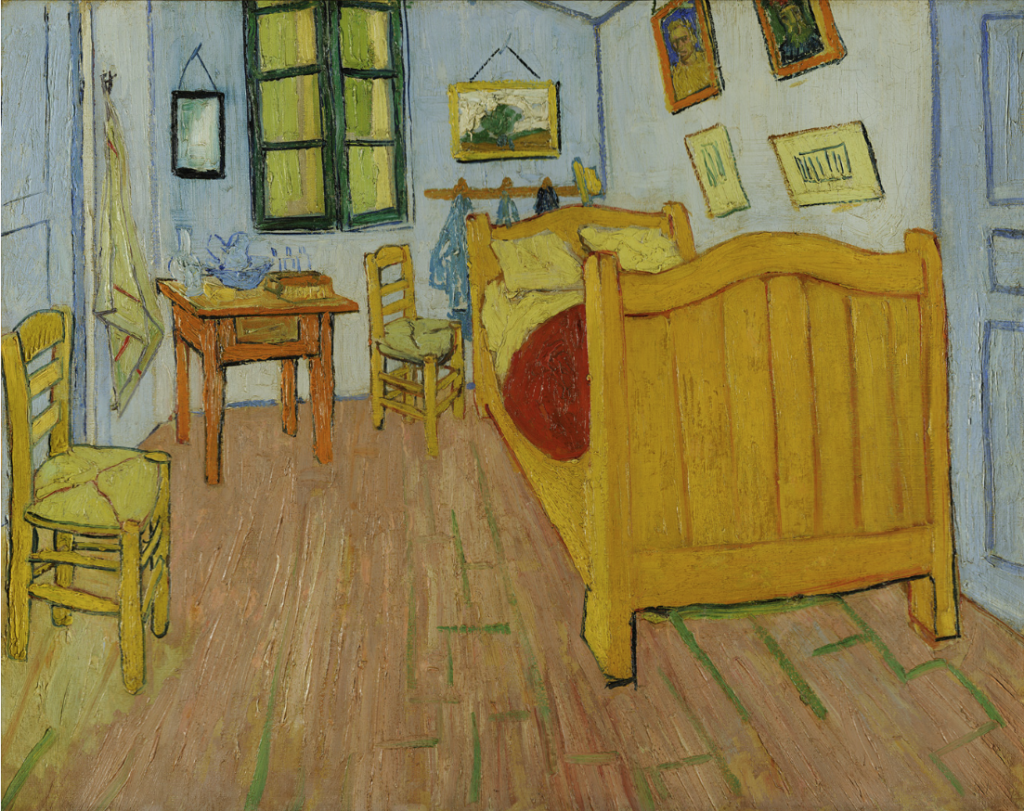
“The Bedroom” is a profoundly personal work depicting Vincent’s bedroom in Arles. The painting’s simplicity and color convey a sense of calm and intimacy, offering a glimpse into Vincent’s private world.
Enigmatic Stories and Rumors
Vincent’s life was not without its share of enigmatic stories and rumors. His relationship with Gauguin, his infamous ear incident, and his tragic death by suicide are shrouded in mystery and speculation, adding to the intrigue surrounding his legacy.
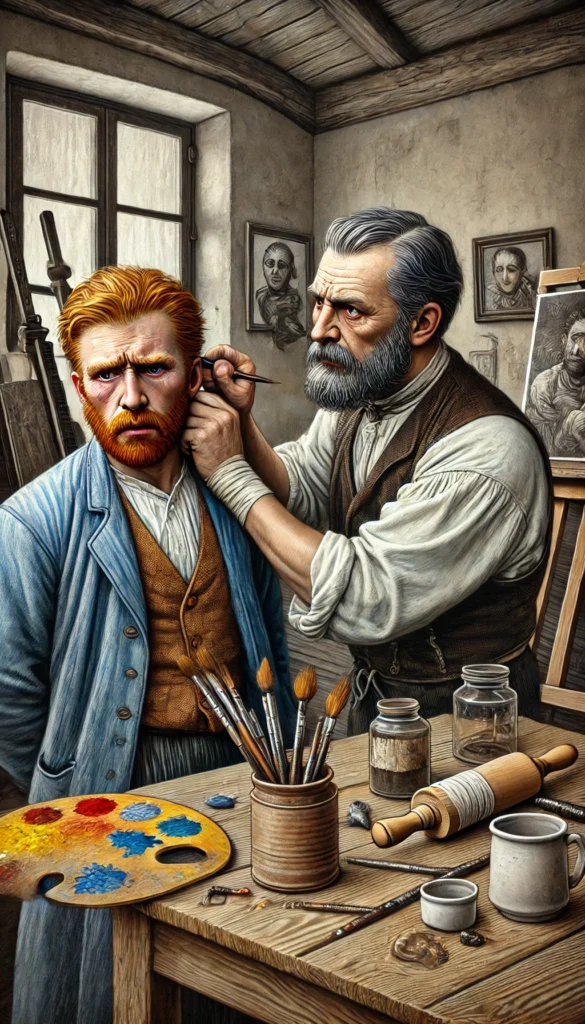
The Gauguin Incident
Vincent’s relationship with Paul Gauguin was both inspiring and tumultuous. The two artists lived together in Arles, but their differing temperaments led to frequent conflicts. The infamous incident in which Vincent cut off part of his ear occurred after a heated argument with Gauguin, adding a dramatic chapter to his life story.
The Mystery of His Death
Vincent’s death at the age of 37 remains shrouded in mystery. While many believe he died by suicide, shooting himself in the chest in a wheat field in Auvers-sur-Oise, recent theories suggest a different scenario. Authors Steven Naifeh and Gregory White Smith, in their 2011 biography “Van Gogh: The Life,” propose that local boys carrying a malfunctioning gun may have accidentally shot Vincent. According to this theory, Vincent, who had an unusual wound for a self-inflicted shot and left no suicide note, might have chosen to protect the boys by claiming he had shot himself. On his deathbed, he reportedly told his brother, Theo, “Do not accuse anyone… it is I who wanted to kill myself.” This theory adds an element of mystery and speculation to the tragic end of his life, reflecting the complex and enigmatic nature of Vincent van Gogh’s story.
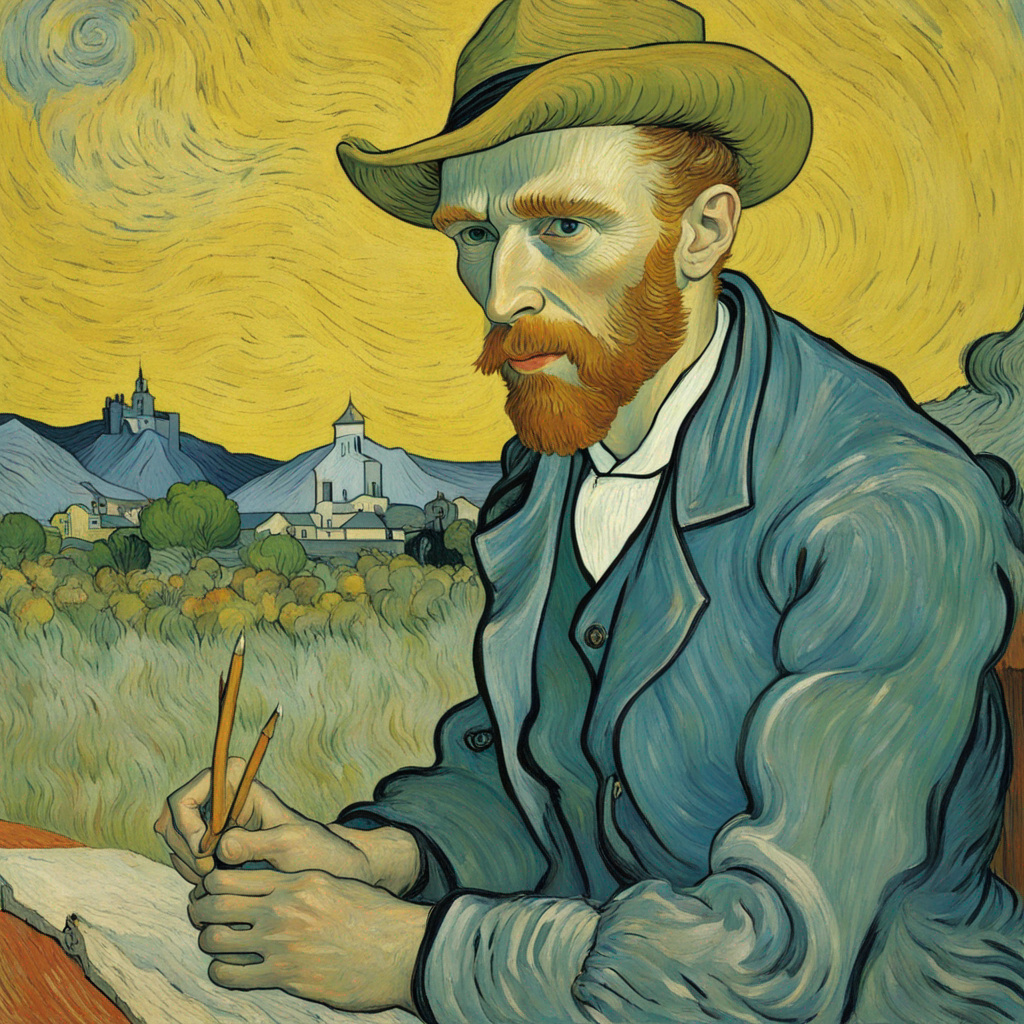
Lifetime Achievements
Despite his struggles and lack of recognition during his lifetime, Vincent’s work has profoundly impacted the art world. His innovative techniques, emotional depth, and unique vision have inspired countless artists and continue to captivate audiences today.
Posthumous Recognition
Vincent’s work gained recognition after his death, largely thanks to Theo’s widow, Johanna van Gogh-Bonger. She tirelessly promoted his work, organizing exhibitions and publishing their correspondence, which helped to establish Vincent’s reputation as one of the greatest artists of all time.
Influence on Modern Art
Vincent’s influence on modern art is immeasurable. His use of color, texture, and expressive brushwork paved the way for movements such as Fauvism and Expressionism. Artists like Henri Matisse and Edvard Munch have cited Vincent’s significant influence on their work.
Modern Context and Relevance
Online Art and Van Gogh
In today’s digital age, van Gogh’s work is more accessible than ever. Online art galleries and platforms have allowed art lovers to buy art online, including prints and reproductions of van Gogh’s masterpieces. This accessibility has helped to cement his status as a beloved figure in the art world.
تشكل المعارض الفنية على الإنترنت أهمية بالغة في إيصال أعمال فان جوخ إلى جمهور عالمي. وتوفر المواقع الإلكترونية المخصصة لفنه صورًا عالية الدقة وأوصافًا تفصيلية وسياقًا تاريخيًا، مما يسمح للمشاهدين باستكشاف أعماله وتقديرها من أي مكان في العالم.
سوق مطبوعات فان جوخ
لا يزال الطلب على مطبوعات فان جوخ مرتفعًا، حيث يحرص جامعو الأعمال الفنية والمتحمسون لها على امتلاك قطعة من إرثه. تقدم المنصات عبر الإنترنت مجموعة واسعة من الخيارات، من النسخ عالية الجودة إلى القطع الفنية الفريدة المستوحاة من أعماله، مما يجعل شراء الأعمال الفنية عبر الإنترنت أسهل من أي وقت مضى.
دور المعارض الفنية على الإنترنت
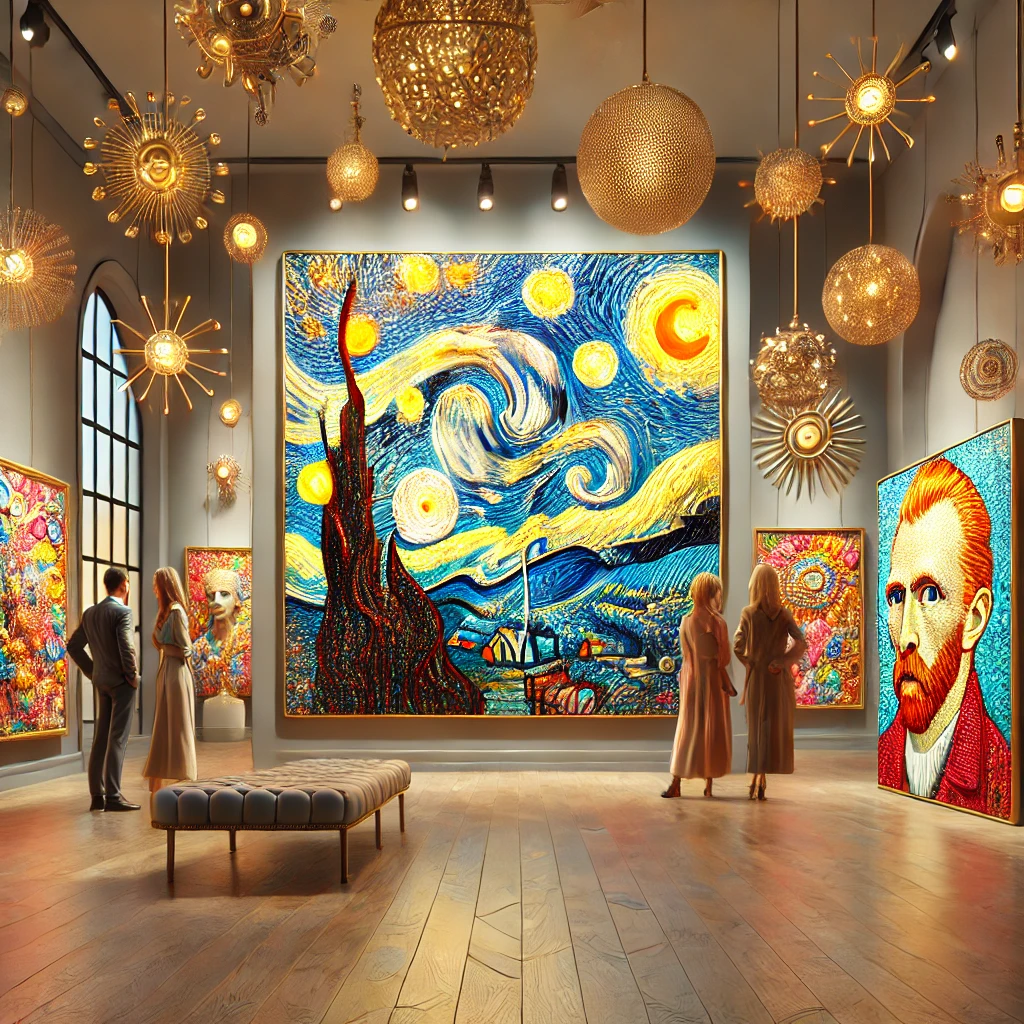
جامعو الأعمال الفنية واتجاهات الفن المعاصر
تظل أعمال فينسنت فان جوخ مطلوبة بشدة من قبل جامعي الأعمال الفنية. وتعتبر أعماله الفنية الفريدة، التي تتميز بعمقها العاطفي وتقنياتها المبتكرة، أصولاً قيمة في أي مجموعة. وتستمر اتجاهات الفن الحديث في استلهام أسلوبه، وغالبًا ما تشيد فنون التجميع وفن الوسائط المختلطة بتقنياته الرائدة.
نداء إلى هواة جمع الأعمال الفنية
يُعجَب هواة جمع الأعمال الفنية بأعمال فان جوخ لأهميتها التاريخية وكثافتها العاطفية وابتكارها الفني. وينظرون إلى امتلاك قطعة من أعمال فان جوخ، سواء كانت أصلية أو نسخة طبق الأصل عالية الجودة، باعتبارها إضافة مرموقة لأي مجموعة.
التأثير على اتجاهات الفن الحديث
إن تأثير فان جوخ واضح في العديد من اتجاهات الفن المعاصر. لقد ألهم استخدامه للألوان والملمس وضربات الفرشاة التعبيرية الفنانين عبر وسائل مختلفة، بما في ذلك الرسم والوسائط المختلطة والتجميع. غالبًا ما يعيد الفنانون المعاصرون تفسير أسلوبه، ويبتكرون قطعًا فنية فريدة تكرم إرثه.
الإلهام الفني والعملية
إن العملية الفنية التي يتبعها فينسنت وإلهامه من الموضوعات التي تحظى باهتمام كبير لدى الفنانين المعاصرين. إن قدرته على إيجاد الجمال والمعنى في الحياة اليومية، وتفانيه في حرفته على الرغم من التحديات الشخصية الهائلة، واستخدامه المبتكر للألوان والأشكال، لا تزال تلهم أجيالاً جديدة من الفنانين.
إن قدرة فينسنت على تحويل المشاهد العادية إلى أعمال فنية غير عادية هي شهادة على رؤيته الفريدة. فقد وجد الإلهام في العالم من حوله، سواء كان حقل قمح، أو ليلة مرصعة بالنجوم، أو مزهرية بسيطة من عباد الشمس. ولا تزال هذه القدرة على إيجاد الجمال في الحياة اليومية تلهم الفنانين اليوم.
إيجاد الجمال في الحياة اليومية
التفاني في الحرفة
ظل فينسنت مخلصًا لمهنته على الرغم من التحديات الشخصية والمهنية العديدة التي واجهها. وعلى الرغم من الشدائد، فإن سعيه الدؤوب لتحقيق التميز الفني يعد مثالاً قويًا للفنانين المعاصرين. ويسعى العديد من الفنانين إلى محاكاة التزامه بعمله واستعداده لتجربة تقنيات وأساليب جديدة.
قطع فنية فريدة وتفسيرات حديثة
كثيرًا ما يعيد الفنانون المعاصرون تفسير أعمال فان جوخ، فيبتكرون قطعًا فنية فريدة تمزج بين أسلوبه الأيقوني والموضوعات المعاصرة. ويسلط هذا الحوار المستمر بين الماضي والحاضر الضوء على الطبيعة الخالدة لفنه وتأثيره الدائم على عالم الفن.
لا يزال الفنانون في جميع أنحاء العالم يستلهمون أعمال فان جوخ، فيبتكرون تفسيرات معاصرة تمزج بين أسلوبه المميز والعناصر الحديثة. غالبًا ما تستكشف هذه الأعمال الفنية الفريدة موضوعات وتقنيات جديدة مع تكريم العمق العاطفي والروح الإبداعية لأعمال فان جوخ الأصلية.
إعادة تفسيرات معاصرة
جاذبية فان جوخ الخالدة
تكمن جاذبية أعمال فان جوخ الخالدة في قدرتها على التأثير في المشاهدين عبر ثقافات وعصور مختلفة. تلتقط لوحاته المشاعر والتجارب العالمية، مما يجعلها ذات صلة ومتاحة للجمهور المعاصر. تضمن هذه الصلة الدائمة أن إرث فان جوخ سيستمر في إلهام وأسر الأجيال القادمة.
تقاطع الفن والحياة الحديثة
الفن في الأرجنتين والتأثير العالمي
يمتد تأثير فينسنت فان جوخ إلى ما هو أبعد من أوروبا. فقد ألهمت أعماله فنانين من جميع أنحاء العالم، بما في ذلك الأرجنتين، حيث لا يزال المشهد الفني النابض بالحياة يحتفل بإرثه. غالبًا ما يستلهم الفنانون الأرجنتينيون، بما في ذلك أولئك الذين يبدعون فن المعجبين بميسي، الإلهام من أسلوب فان جوخ العاطفي وتقنياته المبتكرة.
التأثير العالمي لفان جوخ
تؤثر أعمال فان جوخ على مجتمعات الفن في جميع أنحاء العالم. وفي الأرجنتين، يتبنى العديد من الفنانين المعاصرين استخدامه التعبيري للألوان وضربات الفرشاة الجريئة. ويؤكد هذا التقدير العالمي لفن فان جوخ على جاذبيته العالمية وإرثه الدائم.
غالبًا ما يستلهم الفنانون الأرجنتينيون المعاصرون إلهامهم من تقنيات فان جوخ وكثافته العاطفية. على سبيل المثال، قد يدمج فنانو الفن المعجبون بميسي ضربات فرشاة فان جوخ الدوامية وألوانه النابضة بالحياة لالتقاط الطاقة الديناميكية وشغف لاعب كرة القدم الأسطوري. يسلط هذا الاندماج بين الماضي والحاضر الضوء على الأهمية المستمرة لابتكارات فان جوخ الفنية.
الفنانون الأرجنتينيون المعاصرون
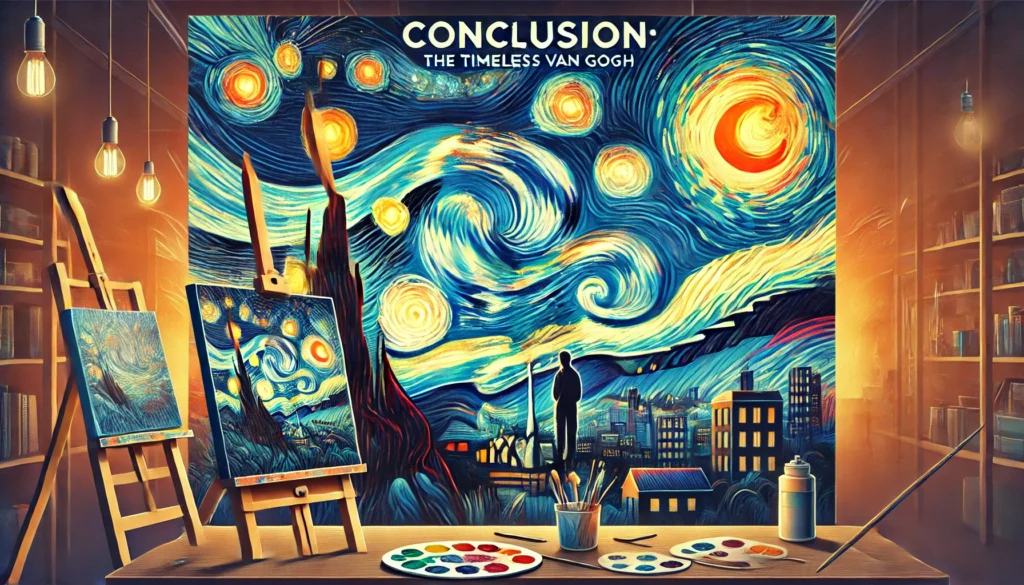
الخاتمة: الإرث الخالد لفينسنت فان جوخ
إن حياة فينسنت فان جوخ وأعماله تشهد على قوة الإبداع والمثابرة. إن رحلته، التي تميزت بالنضالات العميقة والإنجازات المذهلة، تلهم وتأسر الجماهير في جميع أنحاء العالم. وبينما نحتفل بإرثه، فإننا ندرك أيضًا كيف لا يزال فنه يتردد صداه في العصر الحديث، ويسد الفجوة بين الماضي والحاضر.
لقد تركت قدرة فينسنت فان جوخ على تحويل اضطراباته الداخلية إلى أعمال فنية خلابة بصمة لا تمحى على العالم. لقد أثرت تقنياته المبتكرة وعمقه العاطفي ورؤيته الفريدة على عدد لا يحصى من الفنانين وما زالت تشكل عالم الفن اليوم. سواء من خلال المعارض الفنية عبر الإنترنت أو إعادة التفسيرات المعاصرة أو الجاذبية الخالدة لأعماله الأصلية، فإن إرث فينسنت فان جوخ لا يزال باقيًا، ويذكرنا بالقوة الدائمة للفن في التأثير والإلهام.
